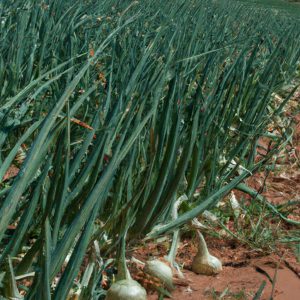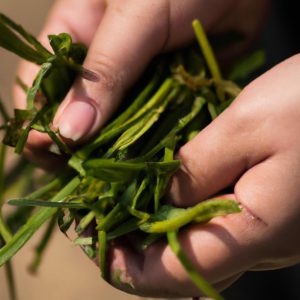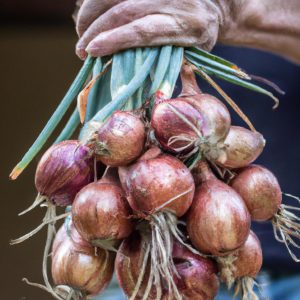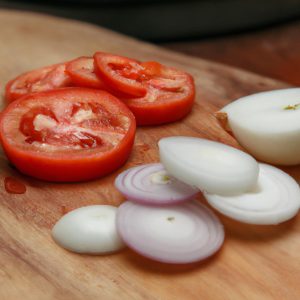As a lover of onions, you may have come across sprouted onions and wondered whether they are safe to eat. It is a common concern, and rightly so. The good news is that you have come to the right place to find answers. In this article, we will explore the topic of sprouted onions and answer the question, “Can you eat sprouted onions?”
Knowing whether sprouted onions are safe to eat is important for a few reasons. Firstly, onions are a staple ingredient in many dishes, and knowing how to store them properly is crucial to avoid waste. Secondly, sprouted onions may not only be unsavory but may also pose potential health risks. Lastly, it is essential to stay informed and make informed choices about the food we consume.
So, let’s dive in and find out everything you need to know about sprouted onions.
What are Sprouted Onions?

Onions are a versatile and essential ingredient in many dishes, but what are sprouted onions? Simply put, a sprouted onion is an onion that has started to grow green shoots from its bulb.
Definition of Sprouted Onions
Sprouted onions are onions that have started to grow green shoots from their bulbs. These shoots emerge from the top of the onion and can grow up to several inches long.
Reasons Why Onions Sprout
Onions sprout due to a natural process triggered by environmental factors such as temperature, moisture, and light exposure. Sprouting usually occurs when onions are stored in warm and humid conditions. As the onion bulb starts to sprout, it uses up its stored energy to grow the shoot.
How to Identify Sprouted Onions
Identifying sprouted onions is easy. Look out for onions that have green shoots emerging from the top of their bulbs. The shoots are usually green, slimy, and can grow up to several inches long. Additionally, sprouted onions may have a soft or mushy texture, and their outer layers may have started to dry out.
Are Sprouted Onions Safe to Eat?

When it comes to sprouted onions, safety is a significant concern. While some people may choose to cut off the sprouts and consume the remaining onion, others may prefer to avoid sprouted onions altogether. But what are the potential health risks of eating sprouted onions?
Potential Health Risks of Eating Sprouted Onions
Sprouted onions may contain harmful bacteria, especially if they are not stored correctly. The sprouts can create an ideal environment for bacteria to grow and thrive. Eating contaminated sprouted onions can lead to food poisoning, which can cause symptoms such as nausea, vomiting, diarrhea, and fever.
Additionally, sprouted onions may contain higher levels of nitrates, which can convert to nitrites, a potentially harmful chemical. Nitrites can react with other compounds in the stomach to form nitrosamines, which have been linked to cancer.
Chemical Changes that Occur in Sprouted Onions
When onions sprout, they undergo a chemical change. The sprouting process leads to the breakdown of carbohydrates, resulting in the formation of simple sugars. This process can also lead to the breakdown of amino acids and the release of ammonia, which can cause an unpleasant taste and odor.
Furthermore, sprouted onions may contain lower levels of antioxidants and other beneficial nutrients. The longer onions sprout, the more nutrients they lose, which can impact their overall nutritional value.
The Impact of Sprouted Onions on the Body
Eating sprouted onions can have various effects on the body, depending on the individual. Some people may experience digestive issues due to the presence of harmful bacteria, while others may be more sensitive to the release of ammonia.
Overall, while sprouted onions may not necessarily be harmful to everyone, it is crucial to be cautious when consuming them. It is best to avoid sprouted onions that have been stored for an extended period and to discard any onions that show signs of mold or rot.
Nutritional Value of Sprouted Onions

Onions are known for their nutritional benefits, but do sprouted onions retain the same nutritional value as non-sprouted onions? Let’s take a closer look at the changes in nutritional value when onions sprout and compare the nutritional value of sprouted and non-sprouted onions.
Changes in Nutritional Value of Onions when they Sprout
When onions sprout, there are chemical changes that occur, which can affect the nutritional value of the onion. The sprouting process leads to a decrease in certain nutrients, including vitamin C, folate, and potassium. On the other hand, there is an increase in other nutrients, such as quercetin, a flavonoid that has anti-inflammatory properties.
Comparison of Nutritional Value between Sprouted and Non-sprouted Onions
While sprouted onions may have a few nutritional benefits, non-sprouted onions are still the better choice when it comes to nutritional value. Non-sprouted onions are rich in vitamin C, which is essential for immune function and wound healing, and folate, which is crucial for cell growth and development. Non-sprouted onions also contain more potassium, which is important for maintaining healthy blood pressure.
In conclusion, while sprouted onions may have some nutritional benefits, non-sprouted onions are still the best choice when it comes to nutritional value. It is important to store onions properly to prevent sprouting and ensure that they retain their optimal nutritional value.
Ways to Use Sprouted Onions
When it comes to cooking with sprouted onions, many people are unsure of what to do. While sprouted onions may not be as aesthetically pleasing as their non-sprouted counterparts, they can still be used in a variety of dishes. Here are some culinary uses for sprouted onions:
Culinary Uses of Sprouted Onions
- In soups and stews: The soft texture and milder flavor of sprouted onions make them perfect for adding to soups and stews.
- In salads: Sprouted onions can add a unique crunch and texture to your salads.
- In stir-fries: The slight sweetness of sprouted onions makes them a great addition to stir-fries, adding depth to the dish.
Ways to Incorporate Sprouted Onions into Recipes
- Use sprouted onions in place of regular onions in recipes: You can use sprouted onions in any recipe that calls for onions.
- Make onion powder: If you have a lot of sprouted onions, you can make your own onion powder by dehydrating and grinding them.
- Make pickled onions: Pickling sprouted onions can help to extend their lifespan and add a tangy flavor to your dishes.
Tips on Cooking with Sprouted Onions
- Remove the sprout: If the sprout is too long and thick, it is best to remove it before using the onion in your recipe.
- Use fresh sprouted onions: It is best to use sprouted onions as soon as possible to avoid spoilage.
- Store sprouted onions properly: To extend the lifespan of sprouted onions, store them in a cool, dry place, away from other produce.
By incorporating sprouted onions into your cooking, you can add a unique flavor to your dishes and reduce food waste. With these tips, you can make the most of your sprouted onions and enjoy their culinary potential.
Conclusion
In conclusion, we have learned that sprouted onions are safe to eat, but caution is necessary. Although sprouted onions may not be harmful, they may not be as flavorful as fresh onions. Moreover, sprouted onions may not be as nutritionally dense as fresh onions.
It is essential to remember that the quality of your sprouted onions plays a crucial role in their safety for consumption. If your sprouted onions show signs of rot, mold, or have an unpleasant odor, it is best to discard them.
In summary, sprouted onions are a common occurrence and can be safely consumed with proper preparation and storage. By following the tips and information provided in this article, you can enjoy sprouted onions in your meals without compromising your health or taste buds.
Stay informed and make informed choices about the food you consume. For more information about onions and other related topics, visit our website onionfacts.com.
Remember, sprouted onions are not a lost cause and can still be used in various dishes. So, the next time you come across a sprouted onion, don’t throw it away. Instead, give it a chance and enjoy the unique taste it offers.







